|
|
|
Sort Order |
|
|
|
Items / Page
|
|
|
|
|
|
|
| Srl | Item |
| 1 |
ID:
119188
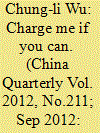

|
|
|
|
|
| Publication |
2012.
|
| Summary/Abstract |
While the judicial system is an important part of any given political regime, other than in a few Western countries, it has received comparatively little attention. This study employs vote-buying litigation as a litmus test to inquire whether or not the judiciary in Taiwan is politically biased in its judgments. Vote buying has long marred Taiwan's elections and the general public does not seem to trust the judicial system to be independent of political influences. This study examines the impact of political variables (including partisanship, whether candidates are elected or not, and the type of election) on court decisions in vote-buying litigation between 2000 and 2010. The article looks at these decisions at three levels: district courts, high courts, and the Supreme Court. The empirical findings indicate that the effects of political factors are considerably less an influence than expected on trial outcomes.
|
|
|
|
|
|
|
|
|
|
|
|
|
|
|
|
| 2 |
ID:
138356
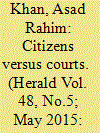

|
|
|
| 3 |
ID:
137363
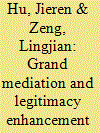

|
|
|
|
|
| Summary/Abstract |
China has seen numerous instances of collective resistance in recent years. Suppression cannot stop popular resistance. It is also hard to solve all problems through the existing judicial system, administrative method or by social means. Based on a case study in Sichuan, this article studies the Grand Mediation (GM) mechanism in Guang'an as one of the ways in which the Chinese government chooses to build institutions and channel social grievances. GM is successful in containing social conflicts and helping the state to garner legitimacy by reducing people's hostility towards local government, which could enhance the CCP's legitimacy, whose paramount goal is to maintain political stability and social harmony.
|
|
|
|
|
|
|
|
|
|
|
|
|
|
|
|
| 4 |
ID:
130229
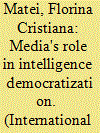

|
|
|
|
|
| Publication |
2014.
|
| Summary/Abstract |
In their path toward democratic consolidation, emerging democracies endeavor to ensure the democratic transfer of political power, bring changes in the legal framework, transform their executive, legislative, and judicial systems, boost free market economy, and develop robust and functional civil societies. They also institutionalize democratic civil-military relations (CMR) by establishing new security institutions-military, police, and intelligence agencies-that are under democratic civilian control, effective, and efficient. Of these many tasks, the democratization of intelligence agencies is by far the most daunting, as effectiveness and efficiency involve secrecy, while democratic control implies transparency, openness, and accountability. Nevertheless, democratic reform of intelligence in new democracies, though difficult, is not impossible, if and when civilians are interested and willing to "invest" in intelligence and intelligence reform. The contribution of external factors, such as media, 2 civil society, international groups, and individuals involved in human rights, may also be instrumental in achieving a balance between control and effectiveness of intelligence
|
|
|
|
|
|
|
|
|
|
|
|
|
|
|
|
| 5 |
ID:
040325


|
|
|
|
|
| Publication |
London, Kegan Paul International, 1990.
|
| Description |
xxiii, 337p.hbk
|
| Standard Number |
0710303955
|
|
|
|
|
|
|
|
|
|
|
|
Copies: C:1/I:0,R:0,Q:0
Circulation
| Accession# | Call# | Current Location | Status | Policy | Location |
| 032595 | 953.8053/ALF 032595 | Main | On Shelf | General | |
|
|
|
|
| 6 |
ID:
179781
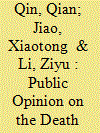

|
|
|
|
|
| Summary/Abstract |
Mainland China and Taiwan are two significant regions currently executing the death penalty; especially, Mainland China alone is believed to implement an amount of executions even larger than the total of all other countries. However, although Mainland China and Taiwan share the Chinese language, as well as traditional culture, the public’s opinions on the death penalty diverge. There is no evidence showing that more people are becoming abolitionists, albeit different social groups, domestic and overseas, are trying to propel the process of abolitionism. The public’s opinions on the death penalty are highly influenced by various factors, including cultural and historical ones, which are considered to be fundamental. Besides, the media, the public’s confidence in the judicial system, nationalism and international pressure also impact the public opinion. The governments of both Mainland China and Taiwan should take further actions in terms of the judicial system.
|
|
|
|
|
|
|
|
|
|
|
|
|
|
|
|
| 7 |
ID:
131952
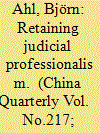

|
|
|
|
|
| Publication |
2014.
|
| Summary/Abstract |
In 2011 and 2012, the Supreme People's Court (SPC) published its first "guiding cases." Guiding cases serve as decision-making models that must be taken into account by lower courts when deciding similar cases. This study argues that the establishment of a national formal legal mechanism to improve consistency in adjudication across jurisdictions and geographical boundaries will strengthen judicial professionalism. The guiding cases system provides the SPC with an instrument to steer adjudication in lower courts discreetly, thereby allowing it to exercise significant influence over legal developments. Given the complexity of cases, compared to law set out in statute, non-lawyers may have tremendous difficulty in understanding and assessing the effects of guiding cases; this in turn acts as a protective mechanism against extra-legal interference. The reform is an example of the SPC's delicate manoeuvring in order to retain judicial professionalism in a hostile yet politically conservative environment. It reflects an attempt by the SPC to strengthen its position vis-à-vis other actors of the party-state and to consolidate the judiciary's function as an adjudicative institution that works on the basis of formal legal mechanisms.
|
|
|
|
|
|
|
|
|
|
|
|
|
|
|
|
| 8 |
ID:
129304
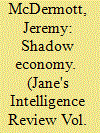

|
|
|
| 9 |
ID:
103281
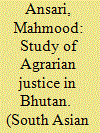

|
|
|
| 10 |
ID:
078519
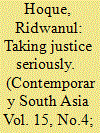

|
|
|
|
|
| Publication |
2006.
|
| Summary/Abstract |
By analysing public interest litigation (PIL) jurisprudence, this article examines Bangladeshi judicial activism in dispensing justice through the promotion and protection of the 'public interest' and imperatives of constitutionalism. Originally linked with the idea of having an accessible judicial system for the wider community, PIL in Bangladesh previously focused primarily on 'the weak', as well as on pure rights. However, while PIL has recently extended its stake to a broader set of constitutional issues, it has not delivered on its promises. It is said that the elitist use of PIL has undermined a much-needed focus on social justice and public empowerment. This article argues that PIL's underperformance is not rooted in its elite-driven use alone, but is also a consequence of judicial unwillingness to remain jurisprudentially creative. Adopting a broader rather than minimalist approach to PIL, it focuses on the limits of social-rights-centric concept of social justice, and argues that enforcing principles of constitutionalism through PIL, even if pursued by the elites, could be a viable avenue towards social and constitutional justice
|
|
|
|
|
|
|
|
|
|
|
|
|
|
|
|
| 11 |
ID:
121549
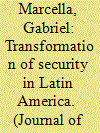

|
|
|
|
|
| Publication |
2013.
|
| Summary/Abstract |
Since the end of the Cold War, there has been a transformation of security in Latin America. Latin American countries have been moving toward the concepts of multidimensional security and security of the individual and society, and away from the classical understanding of the security dilemma posed by an external threat to the state. Illegal narcotics, the proliferation of guns, and other transnational threats, combined with undergoverned space and the weak state syndrome, generated an extraordinary crime wave, which gives the region the highest murder rate in the world. Moreover, crime imposes a heavy cost on economic growth and democratic governance. This insecurity crosses international borders, and the institutions of public security-police, military, and judicial systems-are hard pressed to meet the challenge. The privatization of security is a symptom of the problem and a potential source of abuse. The United States shares responsibility for the violence due to U.S. demand for illegal drugs and the fact that it is a supplier of arms to Latin America. At the same time, there is a growing consensus in support of common action, as evidenced by the international coalition that is operating under Operation Martillo-the antinarcotics effort in the Caribbean and Central America. Moreover, a number of Latin American countries contribute to international peace operations. Accordingly, the new strategic consensus among Latin American countries should be a cause for common action.
|
|
|
|
|
|
|
|
|
|
|
|
|
|
|
|
|
|
|
|
|